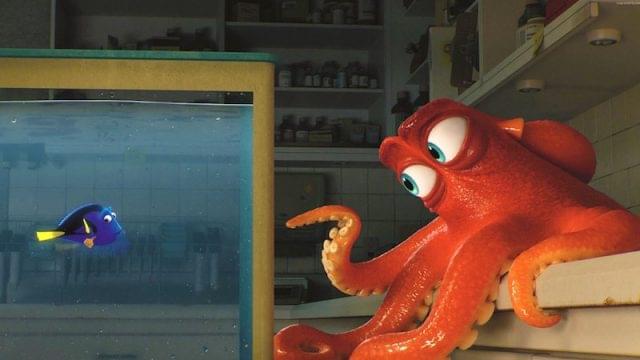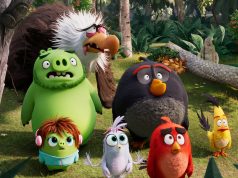
Like most Pixar movies, “Finding Dory” is a kind-hearted and funny film about psychologically damaged characters seeking happiness in the face of impermanence and death. To fully appreciate it, adults should consider that most of the children in the audience around them were not alive when “Finding Nemo” came out. The adults should despair of this fact and embrace their loved ones tighter, before time runs out.
Again written and directed by Andrew Stanton (“WALL-E”), this time with Angus MacLane as co-director, “Dory” picks up a year after “Nemo” left off, with Dory (Ellen DeGeneres) the forgetful blue tang living happily as a neighbor to clownfish Marlin (Albert Brooks) and his son Nemo (Hayden Rolence). (Alexander Gould, the kid who voiced Nemo the first time, is 22 years old now. We will all die someday.) But Dory has begun having flashbacks to her childhood, where she had parents (Eugene Levy and Diane Keaton, for some reason) who loved her dearly and helped her cope with her “short-term remembery loss,” as the adorable baby Dory (Sloane Murray) pronounced it. Suddenly, Dory remembers enough about where she came from to head back there in search of her parents, with Marlin and Nemo right behind.
And so the bulk of the film is set at a seaside California marine institute — assuredly NOT a Sea World type of place, but a facility that rescues and rehabilitates sick or wounded sea creatures and releases them back into the wild, or gives them safe places to live out their days if independence is not an option. Dory, Marlin, and Nemo search the vast premises — tide pools, exhibits, medical labs, all conveniently connected by pipes and attached to the open ocean — for clues.
They meet a variety of colorful new characters, of course, including some bound to become audience favorites. Most important is Hank (Ed O’Neill), a scheming, stealthy octopus who helps Dory in her quest on the condition that she help him avoid being returned to the ocean. His reasons for not wanting to go back are curiously under-explored, but as a single-minded, no-nonsense fellow, he’s a great foil for the absent-minded, all-nonsense Dory. There’s also a near-sighted whale shark (Kaitlin Olson), an echolocation-challenged beluga whale (Ty Burrell), and a couple of cockney sea lions (Idris Elba and Dominic West — “The Wire” reunion!) who are inexplicably and hilariously rude to a third one.
Without spoiling anything, I can assure you that things end happily and satisfyingly for all concerned. Dory, who blames herself for losing her parents in the first place, struggles with her memory impairment but ultimately comes to terms with it. Marlin and Nemo are a secondary concern; for their part, they come to appreciate how Dory-like thinking can be useful and sometimes even better than Marlin’s over-caution.
It’s all lovely and sweet, gentle and humane — very “on-brand” for Pixar. But it doesn’t rise to the creative or emotional heights of its predecessor, and it wavers between being studiously educational on matters of biology (octopuses have three hearts!) and taking liberties with them (these ocean fish all do fine in freshwater, and often in no water at all). Of course, fish shouldn’t be able to speak or read English, either, so I don’t know.
B (1 hr., 37 min.; )





